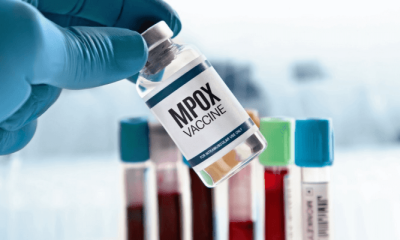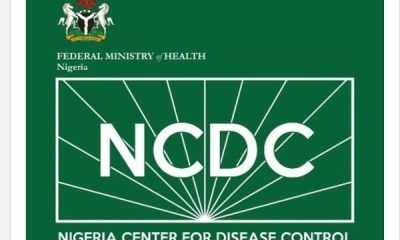Health
Nigeria At Moderate Risk Of Marburg Virus Outbreak, Says NCDC

Following the first-ever outbreak of Marburg Virus Disease in Equatorial Guinea, the Nigeria Centre for Disease Control and Prevention has said Nigeria is at moderate risk of importing the virus into the country.
According to the NCDC, the extent of the outbreak in Equatorial Guinea has not yet been ascertained, and the likelihood of spread in Nigeria following importation is high due to the gatherings and travel associated with upcoming national elections.
It also said the likelihood of importation to Nigeria is high due to the direct flight between Nigeria and Equatorial Guinea, and the proximity of Equatorial Guinea to Nigeria.
Equatorial Guinea on February 13, 2023, confirmed its first-ever outbreak of Marburg virus disease. The viral infection has also killed nine persons in the country.
According to the World Health Organisation, preliminary tests carried out following the deaths of at least nine people in the country’s western Kie Ntem Province turned out positive for viral haemorrhagic fever.
Equatorial Guinean health authorities sent samples to the Institut Pasteur reference laboratory in Senegal with support from WHO to determine the cause of the disease after an alert by a district health official on February 7.
Marburg virus disease is a highly virulent disease that causes haemorrhagic fever, with a fatality ratio of up to 88 per cent. It is in the same family as the virus that causes Ebola virus disease. Illness caused by the Marburg virus begins abruptly, with high fever, severe headache, and severe malaise.
Many patients develop severe haemorrhagic symptoms within seven days. The virus is transmitted to people from fruit bats and spreads among humans through direct contact with the bodily fluids of infected people, surfaces, and materials.
The NCDC, in a press statement signed by its Director-General, Dr Ifedayo Adetifa, on Friday, noted that the likelihood of spread in Nigeria following importation is high due to the gatherings and travel associated with upcoming national elections.
He noted that the case fatality rate of MVD ranges between 24 to 88 per cent and it does not currently have an effective drug for treatment or a licensed vaccine for prevention.
The statement partly read, “There are currently no cases of Marburg virus disease in Nigeria, however, the NCDC, relevant Ministries, Departments, Agencies, and partners have taken proactive measures to mitigate the risk of cross-border importation. The multi-sectoral National Emerging Viral Haemorrhagic Disease Technical Working Group, led by NCDC, is responsible for coordinating the national response to all VHFs across pillars including surveillance, laboratory, case management, and risk communication. The NEVHD TWG like it has always done in the past following news of MVD outbreaks conducted a dynamic risk assessment to inform Nigeria’s preparedness following this recent outbreak in Equatorial Guinea.
“Based on available data, the overall risk of importation of the Marburg virus and the impact on the health of Nigerians has been assessed as MODERATE.
“The risk assessment also shows that Nigeria has the capacity-technical, human (health workforce), and diagnostic – required to respond effectively in the event of an outbreak. Nigeria has also responded to viral haemorrhagic fever epidemics like the Ebola Outbreak in 2014 and built up her preparedness and response capabilities over the years. We have the diagnostic capacity to test for MVD presently at the National Reference Laboratory in Abuja and the University of Lagos Teaching Hospital laboratory Centre for Human and Zoonotic Virology.
“However, diagnostic capacity will be scaled up to other laboratories in cities with important points of entry and others as may be required. An effective response system is in place with the availability of control capacities (trained rapid response teams, and an effective infection prevention and control programme) to limit the risk of spread in the event of a single imported case.”
The NCDC advises Nigerians and residents to avoid all but essential travels to Equatorial Guinea at this time.
“Persons with recent travel history to or transit through Equatorial Guinea within the past 21 days who experience symptoms such as fever, muscle pain, sore throat, diarrhoea, weakness, vomiting, stomach pain, or unexplained bleeding or bruising should not go to any health facility but call 6232 or their State Ministry of Health hotline immediately for assessment and testing,” the agency added.
THE PUNCH
-

 News4 days ago
News4 days agoRamadan, Lent: Shettima Calls For National Unity And Compassion
-

 Opinion4 days ago
Opinion4 days agoReinventing Osun’s Economy Through Dagbolu Intl. Trade Centre: From Quiet Market Lessons To Regional Trade Revolution By Adeboye Adebayo
-

 News3 days ago
News3 days agoInsecurity: Kogi Schools Resume On Monday
-

 News4 days ago
News4 days ago‘Wike Factor’: Another PDP Chairmanship Candidate Steps Down For APC In FCT














